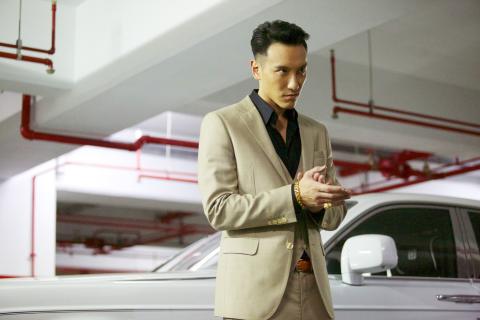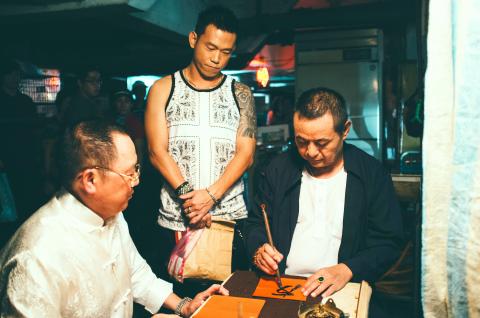Joe Lee (李運傑) packs plenty into his latest film, Gatao, a gangster drama that features plenty of bloodshed, turf wars, romance and familial bonding.
Unfortunately none of these tropes click.
Despite superior production values and a handsome cast led by Alien Huang (黃鴻升) and Sunny Wang (王陽明), the film fails to depict the fascinating world of gatao — Taiwan’s criminal world — and instead devolves into soap-opera frippery filled with narrative loopholes and false emotions.

Photo courtesy of Winday
In the beginning of Gatao, gang life involves street fights with sticks and knives, but everyone is under the control of Boss Yong (Tsai Chen-nan, 蔡振南). To Xiong (Huang), who is arrested during a turf battle, serving time for the gang is proof of brotherhood. Upon his release from prison, Xiong is immediately promoted by Boss Yong to oversee a traditional market where he grew up.
At first, life at the market is good. Xiong knows everyone and takes up the responsibility to look after the shopkeepers. He also strikes up a romance with childhood friend Lei Lei (Christina Mok, 莫允雯). Meanwhile, Xiong’s popularity grows, becoming a threat to Yong’s right-hand man Qing Feng (Sun Peng, 孫鵬),who has a crush on Lei Lei, and believes he is next in line to head the gang.
Things quickly deteriorate when Michael (Wang), the US-educated son of the late rival-gang leader, returns to claim his throne. Depicted as crude and money-driven, the entrepreneurial Michael sees himself as a property developer and has set his mind on what he views as a profitable urban renewal project. But Michael’s plan involves tearing down the market.

Photo courtesy of Winday
Conflicts and bloodletting soon ensue. Torn between his responsibility to the gang and his love for the grandmother who raised him and Lei Lei, Xiong now must make difficult choices that eventually lead to betrayal and murder.
The film’s promising examination of traditional values and runaway capitalism largely goes astray. The motives and struggles of the characters are written and performed, but never felt and conveyed. Throughout the over 100-minute long screening time, there is a constant bombardment of melodramatic cliches and genre gimmickry, leading to nothing more than lame mimicry.
One thing worth mentioning is the film’s lush cinematography that graciously captures a familiar side of Taiwanese life, ranging from fluorescent-lit, crowded interiors to the messy, bustling night markets.

Photo courtesy of Winday

From the last quarter of 2001, research shows that real housing prices nearly tripled (before a 2012 law to enforce housing price registration, researchers tracked a few large real estate firms to estimate housing price behavior). Incomes have not kept pace, though this has not yet led to defaults. Instead, an increasing chunk of household income goes to mortgage payments. This suggests that even if incomes grow, the mortgage squeeze will still make voters feel like their paychecks won’t stretch to cover expenses. The housing price rises in the last two decades are now driving higher rents. The rental market

July 21 to July 27 If the “Taiwan Independence Association” (TIA) incident had happened four years earlier, it probably wouldn’t have caused much of an uproar. But the arrest of four young suspected independence activists in the early hours of May 9, 1991, sparked outrage, with many denouncing it as a return to the White Terror — a time when anyone could be detained for suspected seditious activity. Not only had martial law been lifted in 1987, just days earlier on May 1, the government had abolished the Temporary Provisions Effective During the Period of National Mobilization for Suppression of the Communist

Hualien lawmaker Fu Kun-chi (傅?萁) is the prime target of the recall campaigns. They want to bring him and everything he represents crashing down. This is an existential test for Fu and a critical symbolic test for the campaigners. It is also a crucial test for both the Chinese Nationalist Party (KMT) and a personal one for party Chairman Eric Chu (朱立倫). Why is Fu such a lightning rod? LOCAL LORD At the dawn of the 2020s, Fu, running as an independent candidate, beat incumbent Democratic Progressive Party (DPP) lawmaker Hsiao Bi-khim (蕭美琴) and a KMT candidate to return to the legislature representing

Fifty-five years ago, a .25-caliber Beretta fired in the revolving door of New York’s Plaza Hotel set Taiwan on an unexpected path to democracy. As Chinese military incursions intensify today, a new documentary, When the Spring Rain Falls (春雨424), revisits that 1970 assassination attempt on then-vice premier Chiang Ching-kuo (蔣經國). Director Sylvia Feng (馮賢賢) raises the question Taiwan faces under existential threat: “How do we safeguard our fragile democracy and precious freedom?” ASSASSINATION After its retreat to Taiwan in 1949, the Chinese Nationalist Party (KMT) regime under Chiang Kai-shek (蔣介石) imposed a ruthless military rule, crushing democratic aspirations and kidnapping dissidents from